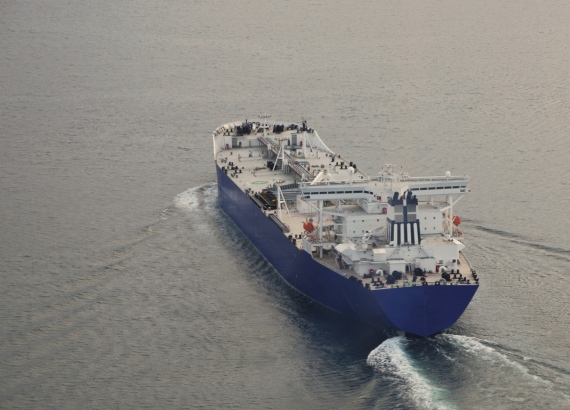When the Arab oil embargo hit in 1973, long gas station lines formed around the country, and frustrated motorists waited for hours in line to fill up. In a few short months, prices at the pump doubled and the decision was made to halt all U.S. oil exports as a result of the crisis. That decision was finally, at least on a partial basis reversed, as domestic energy production has jumped dramatically in the past four years.
As we and many other outlets reported, the U.S. Department of Commerce granted permission to two domestic companies to transport and export condensate, which is lighter than crude oil, but more volatile and therefore more combustible, which makes it more difficult to transport and process. A new research report from Oppenheimer views the decision by the Commerce Department as a first step in the right direction and hopes that it may be a start to lifting the 40-year oil export ban, which is long overdue in the firm’s opinion.
The report also highlighted five top stocks that are big producers in the Texas Eagle Ford Shale, where there are significant condensate yields in much of the play and easy access to export markets. In addition to the two already approved, the rest of these stocks could be in line for approval as well.
It should be noted that master limited partnership Enterprise Products Partners L.P. (NYSE: EPD) was one of the companies the Commerce Department approved, and they will be involved in the transportation of the condensate.
ConocoPhillips (NYSE: COP) is a large integrated name that draws a solid look at Oppenheimer for possible approval. The company has spent the past five years divesting assets, and although it is cash rich, the company has somewhat dampened earnings and growth expectations. Continued strong pricing could bode well for the company. Its big production ability in the Eagle Ford could bode well for the future. Investors are paid a very nice 3.2% dividend. The Thomson/First Call consensus price target for the stock is $85.64. Shares closed Wednesday at $85.62.
Devon Energy Corp. (NYSE: DVN) plans to invest more than $1.1 billion this year in the Eagle Ford Shale and drill more than 200 wells. The company’s current Eagle Ford crude production has an average gravity of about 52 degrees, and the net discount from West Texas Intermediate crude has averaged about $7 per barrel since acquiring that acreage earlier this year. This differential is expected to remain volatile in the $6 to $12 per barrel range as more production of this type of very light oil continues. Based on current and planned condensate splitter projects, the differential is expected to narrow to $6 to $8 going forward. Investors are paid a 1.2% dividend. The consensus price target is $81.88. Shares closed trading Wednesday at $79.46.
ALSO READ: Merrill Lynch Stock Picks for a Nasdaq Breakout
Marathon Oil Corp. (NYSE: MRO) is a top energy name that makes the UBS list. The company recently informed investors that it plans to divest assets in Angola and the North Sea and use the proceeds to accelerate the development of onshore liquids-rich resources in the United States. Houston, Texas-based Marathon Oil is a leading integrated oil and gas firm with extensive upstream operations. The company’s business is organized into three segments: North America Exploration and Production, International Exploration and Production, and Oil Sands Mining. Investors are paid a 1.9% dividend. The consensus price target is $43.48. Marathon closed Wednesday at $39.71.
Murphy Oil Corp. (NYSE: MUR) is an independent exploration and production company with a strong portfolio of global offshore and onshore assets delivering oil-weighted growth. Murphy produces oil and/or natural gas in the United States, Canada and Malaysia, and it conducts exploration activities worldwide. The company is expanding operations in the Eagle Ford Shale area, which may bode well for the future. Investors are paid a 1.9% dividend. The consensus price target is $68.42. Murphy closed Wednesday at $65.78.
Pioneer Natural Resources Co. (NYSE: PXD) is a huge player in the Permian Basin and the Eagle Ford in Texas, and it has been a big winner for shareholders. The company was also the other firm named by the Commerce Department to produce and export condensate. Rumors have swirled over the past year that one of the big integrateds may target Pioneer as a takeover candidate. It would be a very expensive deal as the company’s market cap is almost 34 billion. The consensus price target is $231.11. Pioneer closed Wednesday at $233.07.
ALSO READ: The 10 Stocks That Will Take the DJIA to 20,000
Consumers seeing gasoline prices spiral higher may roll their eyes at the thought of allowing exports, but current price spikes are due to geopolitical issues in the Middle East and should recede. As the United States becomes increasingly energy independent, thousands of jobs can be created, not only in the energy complex, but in adjacent areas as a result of exporting. This could be an incredible boost to an economy that has a hard time finding a firm footing.
Travel Cards Are Getting Too Good To Ignore (sponsored)
Credit card companies are pulling out all the stops, with the issuers are offering insane travel rewards and perks.
We’re talking huge sign-up bonuses, points on every purchase, and benefits like lounge access, travel credits, and free hotel nights. For travelers, these rewards can add up to thousands of dollars in flights, upgrades, and luxury experiences every year.
It’s like getting paid to travel — and it’s available to qualified borrowers who know where to look.
We’ve rounded up some of the best travel credit cards on the market. Click here to see the list. Don’t miss these offers — they won’t be this good forever.
Thank you for reading! Have some feedback for us?
Contact the 24/7 Wall St. editorial team.




